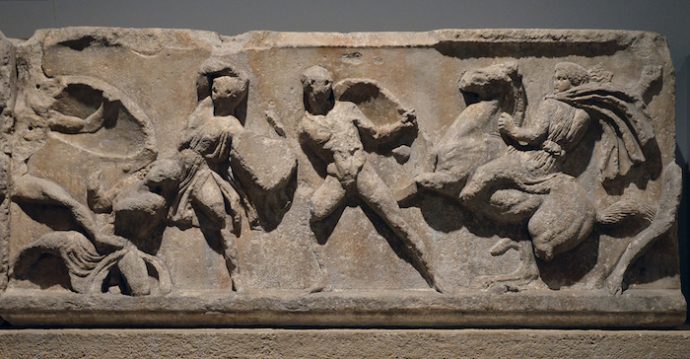“Do what is in your heart. You choose. I’m right here with you whatever you decide” (1 Samuel 14:7).
It’s a beautiful and courageous declaration made by… someone. We don’t know his name, for it’s been lost to history. But though we don’t know his name, we do know his function – he was the armor bearer to Jonathan, son of King Saul, best friend of future king David.
As the armor bearer, he was responsible for carrying everything from containers and tools to musical instruments and weapons. The primary task, though, was to carry the king’s or commander’s armor, shield, and extra weapons. In this case, though, the armor bearer was more than a pack mule – he was an experienced professional soldier. The Hebrew word in the previous verse, 1 Samuel 14:6, has a definite military connotation. It denoted experienced warriors, as opposed to some ragtag militia.
Here we have, then, a fine soldier in his own right, and yet one whose primary task was to come alongside someone else to make sure they had what they needed at the most crucial and vital of times. He was not necessarily the greatest warrior, but instead was the one who equipped the warrior. He was not the one standing at the front of the battle, but instead the one who made another ready for battle. He was not the hero who received the accolades but instead the one who stood in the background in the looming shadow of that hero.
Jonathan had a daring plan, if indeed you could call it a plan: “Come on, let’s cross over to the garrison of these uncircumcised men. Perhaps the Lord will help us. Nothing can keep the Lord from saving, whether by many or by few” (1 Samuel 14:6). With supreme confidence in the power and sovereignty of God, he had little more than a “let’s see what happens” in his mind. And yet here we see this nameless armor bearer, this equipper of the one who is named, doing what he did best – disappearing and fading away, but nonetheless propping up and bolstering the heart as well as the armor of the one he served.
There are other armor bearers in Scripture, though they might not have been called as such:
For Paul, there was Barnabas.
For Moses, there was Aaron.
For Samuel, there was Hannah.
These are the supporting characters, not the leads. They’re the ones who know at least in part what it means to die to oneself for the sake of another. And if we look back at our own lives, we will see armor bearers littered in our wake as well.
We will see moms and dads, Sunday school teachers and mentors, baseball coaches and wise old deacons. Each one committed to seeing us take up the sword God has put in our hands and wielding it, all the while watching from the background. For me personally, I think of Gary and Judy and Gwen and Joe and Ramona and Andy and Mike and Donna and Charlie and John and Cliff and a host of others. And I am but one of those for whom these good people held the armor.
But today, I’m also challenged as well as thankful, for it causes me to wonder: Whose armor am I bearing? Who are the people that I am content to see have great victories in the kingdom? Who are the ones I am investing in so that they can move out?
Whose armor am I bearing?
Or am I just greedy enough to assume that everyone else should hold mine.
The gospel frees us to bear the armor of another. It reminds us that we are not the center of the universe, and indeed that to follow Jesus we must be joyfully willing to fade to black, to die to ourselves, in order to hold up another. But in a gloriously ironic twist, there will be a day when those who voluntarily went last will be first, and those that were voluntarily the least will be called great. And in that day, all the nameless armor bearers will, along with everyone else who loves Jesus, will put down their weaponry. And the Lord will look to them that received little congratulations here on earth and say, “Well done, good and faithful servant.”
Subscribe to MichaelKelley.co
Never miss a new post. Subscribe to receive these posts in your inbox and to receive information about new discipleship resources.





